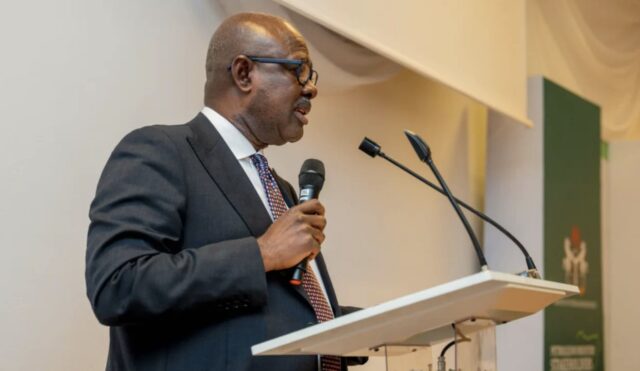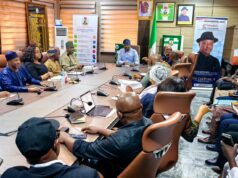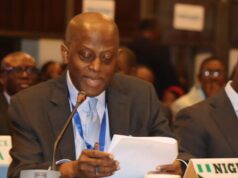Heineken Lokpobiri, minister of state for petroleum resources (oil), says some individuals are exploiting Nigeria’s frontier exploration fund by borrowing money for different purposes.
Speaking on Monday at the 43rd annual international conference and exhibition of the Nigerian Association of Petroleum Explorationists (NAPE), Lokpobiri warned that individuals and agencies responsible for the mismanagement of the fund will be held accountable.
Lokpobiri said the frontier exploration fund, established under the Petroleum Industry Act (PIA), was intended to support new oil exploration efforts in Nigeria’s frontier basins — especially in regions such as Chad, Sokoto, Anambra, Benue, and other underexplored areas.
“We have, under the PIA, the Frontier Exploration Fund domiciled with the NUPRC. That fund itself has to be used now for the purpose of its inclusion in the PIA,” he said.
“Since I became minister, we haven’t placed much premium on using the frontier exploration fund to finance exploration in these places that are largely unexplored.”
Lokpobiri said presently, some individuals “are borrowing the money” for “different purposes”.
“And that is the danger. If you have money lying fallow there, somebody will borrow it in the name of trying to bring it back, and they will never come back. So, who do we hold accountable?” he asked.
“Those who are exploiting these frontier exploration funds will have to be held accountable.”
The minister said the resources should be used to “finance members of NAPE to do the exploration that the money is meant for”.
He described the improper use of the fund as a setback to the nation’s pursuit of energy security and economic stability, warning that Nigeria’s proven reserves and production levels could stagnate without renewed exploration efforts.
The minister emphasised the need for urgent action to reverse the trend and boost investments in discovering new reserves to sustain the country’s oil production and revenue.
“Most of the explorations in Nigeria were done in the 1990s. Whatever figures we are discussing today— the 37 billion barrels of crude oil and 200 million cubic feet of gas — are old figures,” he said.
“The potential is that if we do more exploration, our figures are likely to quadruple.”
Lokpobiri reaffirmed the federal government’s commitment to creating a conducive environment for oil exploration, warning that oil licences held by firms without visible exploration activities would no longer be renewed.
Also speaking, Gbenga Komolafe, the chief executive officer (CEO) of the Nigerian Upstream Petroleum Regulatory Commission (NUPRC), said the 43 field development plans (FDPs) approved this year have the potential to unlock 1.7 billion barrels of crude oil and 7.7 trillion cubic feet of gas.
Represented by Emmanuel Mac-Jaja, director, subsurface development of the commission, Komolafe noted that these FDPs reflects a resurgence of investment in the sector.
“In 2025 alone, 43 new Field Development Plans (FDPs) were approved, unlocking 1.7 billion barrels of oil and 7.7 trillion cubic feet of gas, backed by over $20 billion in committed capital,” he said.
Komolafe added that key final investment decisions (FIDs) — including $5 billion for Bonga North, $500 million for the Ubeta Gas project, and $2 billion for Shell’s HI Gas Project — have collectively unlocked nearly 2 trillion standard cubic feet of gas.
He said indigenous participation in the sector continues to expand, with local acquisition deals surpassing $5 billion, reflecting increasing confidence in homegrown investors.




